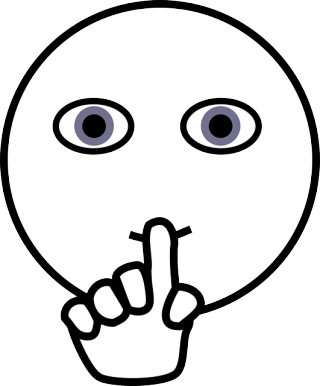Chronic Pain
Part 2: What the Chronically Ill DON’T Want to Hear
Chronically ill readers share unhelpful and hurtful comments made by others.
Posted August 1, 2012

In my article, "What Those with Chronic Pain or Illness DON’T Want to Hear,” I shared some of the comments that have been made to me since I became chronically ill in 2001. Many people shared that they’d been subjected to the very same comments…and more. And so, I’ve put together a small sampling of comments that readers have had to listen to. As I said in the first article, I’m not trying to make fun of others. My intent is to educate people about what we face and also to help us feel less alone.
Bottom line: Fielding these comments with grace and skill is yet another challenge faced by those of us with health problems. I’ve divided the comments into five categories: Change Your Lifestyle; Such an Easy Life; Chronic Means Chronic; It’s Your Fault; and Religion and other Spiritual Matters.
Change Your Lifestyle
1. “Do you take vitamins?” This comment reminds me of the people who’ve asked me if I’ve tried sleeping pills. Who hasn’t taken vitamins?!
2. “Are you eating enough fruits and vegetables?” Lots of people report getting asked this.
3. “Just eat more.”
4. “Just eat less.” (This one forms a nice symmetry with #3.)
5. “Are you drinking water?”
6. “You just need some fresh air and exercise, that’s all.”
7. “Why don’t you go to bed earlier?”
8. “Why don’t you take a shower? You’ll feel better.”
Such an Easy Life…
1. One woman wrote: “I mentioned to a friend when I got to his kid’s birthday party that I almost didn’t make it because I’d been in bed most of the weekend and it was hard getting out of the house. He said, ‘You have such an easy life!’”
2. Wrote another woman: “It’s frustrating when someone thinks you are ‘lucky’ to have so much leisure time available. Yeah, it’s great to have so much time, but I’m unable to work and thus am so far below the poverty line that homeless people begging for change probably have more money at their disposal than I do.”
This raises what I think is a hidden epidemic for those with chronic health problems. Many are living below the poverty line, due to a combination of not being able to work and of having to spend any money they do have on medications and other treatments that health insurance doesn’t cover—if they’re lucky enough to even have health insurance.
3. Finally, this woman sums up “Such an Easy Life…” as well as I could: “My favorite is when people say I’m lucky that I don’t have to work. It’s like telling someone without legs they’re lucky they don’t have to take the stairs.”
Chronic Means Chronic
1. Several people wrote that they’ve been asked, “You’re STILL in pain?” Many people have said to me: “You’re STILL sick?” Yes, we’re still sick and we’re still in pain because…chronic means chronic!
2. Said to a person with chronic pain: “Don’t worry, you’ll be able to go hiking again soon.” I’ve had people say this to me about many activities—from traveling to resuming my teaching career. I think that if you’re not sure what a friend might or might not be able to do in the future, it’s better not to raise it.
3. “Call me when you feel better and we'll go to lunch or do something fun." Again, chronic means chronic.
4. “At least it’s not cancer.” This comment doesn’t fit neatly under any of the categories I’ve used, but I wanted to include it because several people reported having had this said to them. It’s not helpful. In fact, one woman wrote that at least if she had cancer, her family would get more support both from the medical community and from their church congregation.
It’s Your Fault
I recognize that this category is subjective. Comments that I interpret as implying, “It’s your fault,” may not seem that way to others. That said, here’s a sampling of comments that, to me, are suggesting to a person who is sick or in pain: it’s your fault.
1. “You’re too young to be sick,” several people reported being told. One of them added: “Oh, how wish this were true. Maybe by the time I’m in my 80s, people will stop saying it.”
2. One woman reported that her friend, after listening with “a seemingly caring ear,” said: “Attitude is everything, you know.”
3. A young woman wrote that she’s been told to distract herself from chronic pain by “getting a job, mingling with people, and engaging my brain.” About these comments, she said: “I’m sensitive about being perceived as lazy. I’m hurt whenever this comment is made to me. I’d love to be able to will myself to do whatever I’d like.” This resonated strongly with me because I spent years trying to will my body into good health. All I got for my effort was a lot of mental suffering added to the suffering of the illness.
4. “You must be out of alignment with your life and looking for an excuse to make some changes.” The recipient of this comment said, “But some of us really loved our life before we got ill.” To that, I say, “Yes. Yes”! I was never happier—personally and professionally—than when I got sick in 2001.
5. “Look what happens when you don’t look after yourself.”
6. “Just snap out of it.” The woman who reported this comment went on to say: “Like it’s really that simple and I’m so totally dumb and stupid that can’t figure it out. How silly of me after so many years.”
7. Saving the worst for last, a person reported anonymously that his or her doctor said: “If you think of yourself as a cripple, you will become a cripple.” This comment is hurtful and inappropriate in so many ways.
Religion and other Spiritual Matters
We all have our particular religious and spiritual beliefs and they may understandably feel essential to our well-being. But in my opinion, religious and spiritual beliefs are so personal that unless you know that the person you’re talking to shares your beliefs, it's better not to raise the subject.
Keeping in mind that this is a sensitive topic, I offer some comments that have been directed at the chronically ill.
1. Two people wrote that they’ve repeatedly been told, “God never gives us more than we can handle,” and that it’s not at all consoling to them. In fact, they said it makes them feel like failures—as if they’re not handling well what they should be handling well.
2. “God has a plan for your life.”
3. “All things work for the Good for those who love God.” The woman who reported this comment wrote about it: “There’s nothing more annoying than some random bible quote thrown into your face as a ‘reason’ for chronic pain.”
4. “If you pray to God harder and longer, He will cure you.”
5. “The universe is trying to teach you something.”
6. One woman wrote that her brother repeatedly says to her, “Obviously you don’t pray to God enough because if you did, he would heal you. So you must be doing something wrong.” She said that every time he says this, she bursts into tears because she feels blamed for not doing enough to get better.
I’ve found that many comments about religion, regardless of the speaker’s intent, leave people that they’re spoken to feeling as if it’s their fault that they’re sick or in such pain. And so, these comments could have gone under the previous heading: It’s Your Fault.
If you have friends or family who suffer from chronic pain or illness and you're thinking, “So, what can I say?” have a look at my piece, "What People With Chronic Pain or Illness DO Want to Hear." There are a lot of helpful things you can say!
© 2012 Toni Bernhard. Thank you for reading my work. I'm the author of four books:
How to Be Sick: Your Pocket Companion (for those who've read How to Be Sick and for those who haven't). Available May 2020
How to Live Well with Chronic Pain and Illness: A Mindful Guide (2015).
How to Wake Up: A Buddhist-Inspired Guide to Navigating Joy and Sorrow (2013)
All of my books are available in audio format from Amazon, audible.com, and iTunes.
Visit www.tonibernhard.com for more information and buying options.
Using the envelope icon, you can email this piece to others. I'm active on Facebook, Pinterest, and Twitter.
Also see my piece: "How to Respond to Unkind Remarks When You're Chronically Ill."




